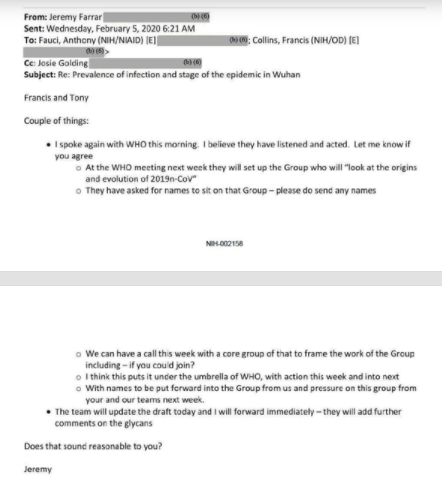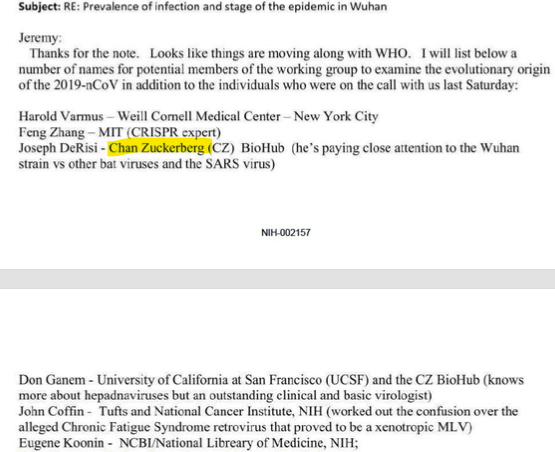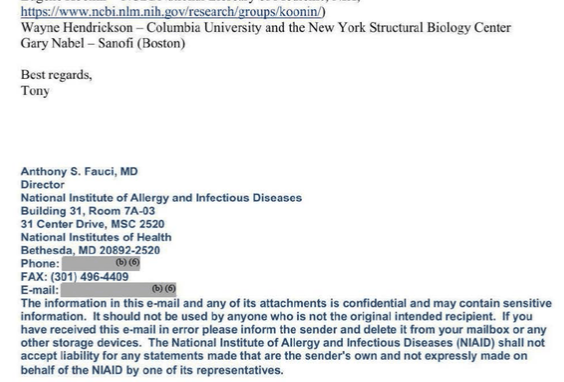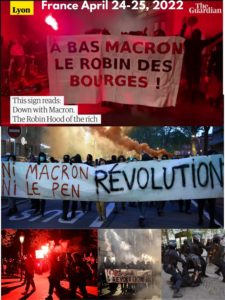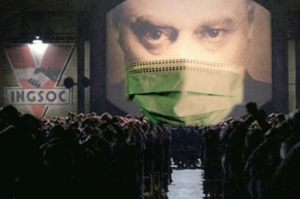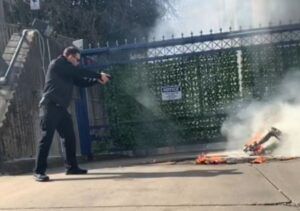US Funded People’s Liberation Army to Engineer Coronavirus
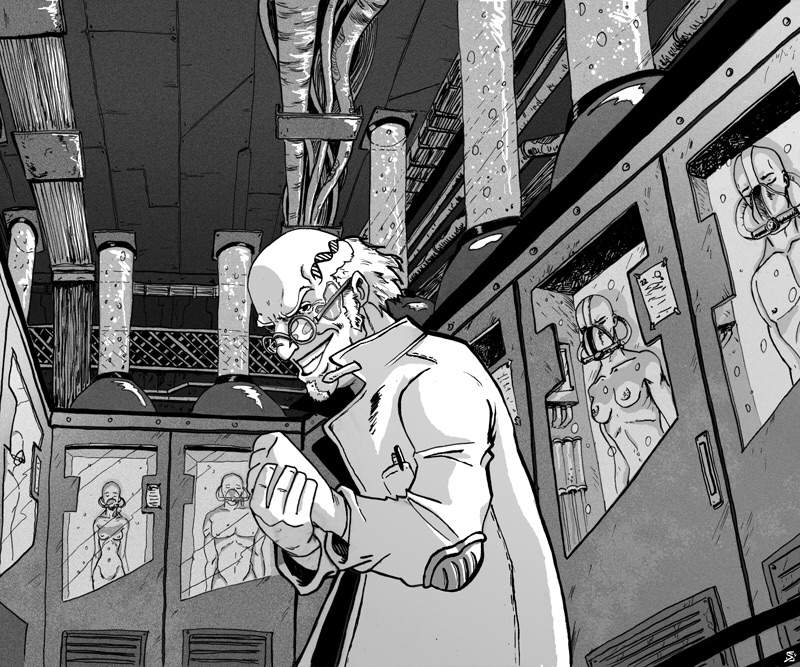
From The Australian:
“Anthony Fauci’s institute funded research by the Chinese military, the Wuhan Institute of Virology and American scientists to genetically manipulate coronaviruses soon before the pandemic hit.
The revelation shows American money was funding risky research on coronaviruses with People’s Liberation Army scientists – including decorated military scientist Zhou Yusen and the Wuhan Institute of Virology’s “Bat Woman”, Shi Zhengli.
Their research paper, submitted to the Journal of Virology in November 2019, was funded with three grants from the National Institutes of Health, via US universities. Details of the research funding, contained in the forthcoming book What Really Happened In Wuhan, go to the heart of whether senior US officials were reluctant to give credence to the theory that Covid-19 may be a result of a laboratory leak, out of concern that it would expose their complicity in providing funding to a facility that intelligence agencies suspected might have sparked the pandemic.
National security sources said the ties between Zhou and Dr Shi supported claims by US intelligence that the Wuhan Institute of Virology was engaged in “secret military activity”.
Zhou, who conducted the research in conjunction with the Wuhan institute, the University of Minnesota and the New York Blood Centre, was the first to file a patent for a Covid-19 vaccine on February 24 last year, according to documents obtained by The Weekend Australian.
This was only five weeks after China admitted there was human-to-human transmission of the virus.
Zhou is listed as the lead inventor on the patent application lodged by the “Institute of Military Medicine, Academy of Military Sciences of the PLA”.
Nikolai Petrovsky, a medical researcher at Flinders University who has been developing a Covid-19 vaccine, said that while it was technically possible to have a vaccine in this time frame, it appeared to be a “remarkable achievement”.
He said it left open the possibility the Chinese scientists were working on a vaccine before authorities publicly admitted there was a coronavirus outbreak.
“This is something we have never seen achieved before, raising the question of whether this work may have started much earlier,” Professor Petrovsky said.
In an extraordinary twist, Five Eyes intelligence agencies are investigating the unexplained death of PLA scientist Zhou in May 2020 as part of their probe into the origins of Covid-19.
While he was an award-winning military scientist, there were no reports paying tribute to his life. His death was only mentioned in passing in a Chinese-media report in July and at the end of a December scientific paper. Both had the word “deceased” in brackets after his name.
The Weekend Australian has established that his death has been treated as unusual and is an early line of inquiry under the new Five Eyes probe into the origins of Covid-19 launched by Joe Biden.
The US President last month ordered the investigation – following a significant shift from early scepticism about the lab leak theory – and asked for it to report in 90 days.
Intelligence agencies have held information about Zhou’s death for some months but there was no active investigation into a potential laboratory leak.
The question of the origin of the pandemic was, for the most part, treated as a cold case with few staff, if any, investigating the matter full-time and with no sense of urgency.
Mr Biden has asked agencies to report back on the question of whether the outbreak is likely to have started through a natural zoonotic jump from animal to humans, or through an inadvertent laboratory leak.
Zhou worked at the Laboratory of Infection and Immunity, Beijing Institute of Microbiology and Epidemiology, which is part of the Chinese Academy of Military Medical Sciences and sits under the control of the PLA.
Born in 1966, Zhou was about 54 years old when the virus broke out in Wuhan.
His work for the Chinese military was extensive. Not only did he graduate from the Chinese Academy of Military Medical Sciences in 1998, but he won the first prize of scientific and technological progress of the army.
Like Dr Shi, his research focus was “new infectious disease pathogens” and immunology research. He worked under Wuchun Cao, a senior PLA colonel who sits on the board of the Wuhan Institute of Virology.
Despite his work for the PLA, Zhou had ties to the US. He did his postdoctoral research at the University of Pittsburgh School of Medicine and had closely collaborated with the New York Blood Centre.
As far back as 2004, the PLA-trained scientist was experimenting with spike proteins in coronaviruses – the point of their infectivity that is often subject to manipulation and gain-of-function research. A 2004 paper that he co-authored and was published in the Journal of Immunology states: “We showed that the S protein of SARS-CoV is highly immunogenic.”
Immunogenic is the technical term for how well a vaccine works – how well it provokes an immune response.
In 2006, Zhou, then at the State Key Laboratory of Pathogen and Biosecurity at the Beijing Institute of Microbiology and Epidemiology, was listed as the main author in a paper that stated the “receptor-blinding domain (RBD) of SARS-CoV spike (S) protein elicits highly potent neutralising antibody responses in the immunised animals”.
The study made clear that they were looking at vaccine development. “In summary, the vaccines containing the (receptor-binding domain) of SARS-CoV S protein may induce sufficient neutralising antibodies and long-term protective immunity against SARS-CoV challenge in the established mouse model,” it reads.
Right before the pandemic, Zhou and three other scientists from the PLA-run Beijing Institute of Microbiology and Epidemiology – Yuehong Chen, Lei He and Shishui Sun – partnered with two Wuhan Institute of Virology scientists – Dr Shi and Jing Chen – and eight Chinese scientists now based in the US at the University of Minnesota and the Lindsley Kimball Research Institute, New York Blood Centre. Their paper, titled Molecular Mechanism for Antibody-Dependent Enhancement of Coronavirus Entry, was submitted to the Journal of Virology on November 27, 2019, and was published on February 14, 2020.
The research examined MERS and SARS coronaviruses as avenues for antibody-based antiviral drug therapy to treat coronaviruses.
Their paper had some positive results: “Taken together, our results show that RBD-specific neutralising MAbs bind to the same region on coronavirus spikes as viral receptors do, trigger conformational changes of the spikes as viral receptors do, and mediate ADE through the same pathways as viral-receptor-dependent viral entry.”
They found this “novel molecular mechanism for antibody-enhanced viral entry” could “guide future vaccination and antiviral strategies”.
This study was conducted “in vitro”, meaning in a petri dish or test tube, using humanised kidney and lung cells. Their last paragraph indicated the next step in a future paper would be to conduct “in vivo” experiments with humanised mice or primates. A paper published in Nature Reviews Immunology 18 months later, in April this year, would find that “neutralising monoclonal antibodies” could help the treatment of Covid-19.
The patent application lodged by Zhou states: “The invention relates to the field of biomedicine, and relates to a Covid-19 vaccine, preparation methods and applications. The fusion protein provided by the invention can be used to develop the Covid-19 protein vaccine and a drug for preventing or treating the Covid-19.”
The close working relationship between Zhou and Dr Shi supports declassified US intelligence released in January that said the Wuhan lab was conducting “military activity”.
“Despite the WIV presenting itself as a civilian institution, the United States has determined that the WIV has collaborated on publications and secret projects with China’s military,” it states.
“The United States and other donors who funded or collaborated on civilian research at the WIV have a right and obligation to determine whether any of our research funding was diverted to secret Chinese military projects at the WIV.”
Dr Fauci, America’s top medical adviser for the Covid-19 pandemic, has come under pressure over the coronavirus research his institute funded at the Wuhan Institute of Virology.
During the early days of the pandemic he did not mention the type of gain-of-function research that was being undertaken at the Wuhan institute, despite being aware of the type of research that was being undertaken in China, funded by America.
Dr Fauci, who declined an interview request, also did not alert nor seek permission from the White House leadership before he lifted, in 2017, the pause on gain-of-function research implemented by the Obama administration in 2014. Instead he raised the issue in a meeting with the White House Office of Science and Technology Policy.
Emails released under a Freedom of Information request from Buzzfeed this week showed that, in the early days of the pandemic, Dr Fauci was concerned that US funding had gone towards gain-of-function research in China.
In other emails, scientists wrote to Dr Fauci expressing the preliminary view that the SARS-CoV-2 genome appeared “inconsistent with expectations from evolutionary theory” and that it had some features that “potentially look engineered”.
A scientist who sent one of the emails on January 31, 2020, Kristian Anderson from the Scripps Institute, authored a paper in Nature Medicine on March 17 last year, claiming it could not have come from a laboratory.
The Weekend Australian has previously reported that a 2012 paper authored by Dr Fauci showed he acknowledged gain-of-function research could spark a pandemic. Writing in the American Society for Microbiology in October 2012, Dr Fauci acknowledged the controversial scientific research could spark a pandemic.
“In an unlikely but conceivable turn of events, what if that scientist becomes infected with the virus, which leads to an outbreak and ultimately triggers a pandemic?” he wrote. “Many ask reasonable questions: given the possibility of such a scenario – however remote – should the initial experiments have been performed and/or published in the first place, and what were the processes involved in this decision?
“Scientists working in this field might say – as indeed I have said – that the benefits of such experiments and the resulting knowledge outweigh the risks.””
As a reminder, Fauci provided recommendations for a WHO group led by Jeremy Farrar, of the big pharma funded Wellcome Fund. Recommendations included a doctor from the Zuckerberg-Chan backed BioHub group.
